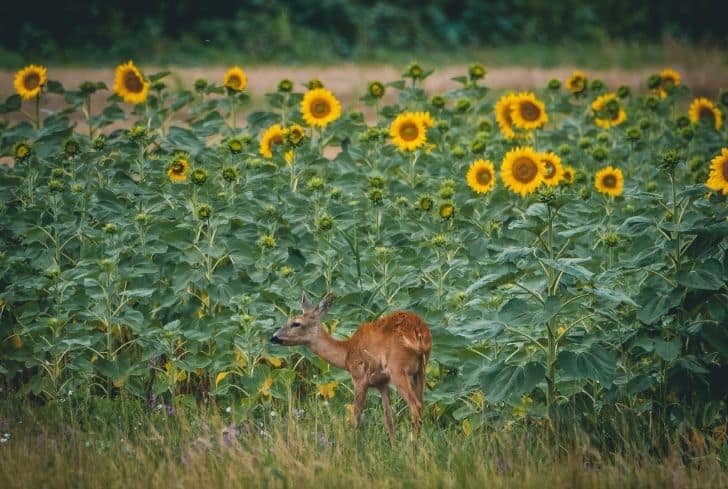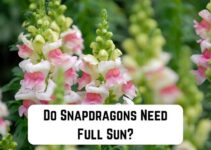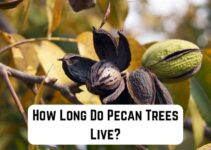While deer are certainly endearing creatures, they often happen to be a major headache for gardening enthusiasts. Why? Because most deer typically enjoy a feast of plants and flowers and there’s no way, your garden is going to be salvaged.
But are deer known to eat sunflowers? Do they even like it? Also, does any other animal eat sunflowers? Well, these are some of the many questions we will explore in this article. So, if you are looking to protect your sunflowers, here’s everything you need to know.
Are Sunflowers Deer Resistant?
Sadly, for those with sunflower gardens, your garden and flowers aren’t resistant to deer. These animals love the leaves of sunflowers and if they are hungry enough, they will also devour the flowers.
To make things worse, they aren’t dissuaded by height either. Your sunflowers won’t be deer resistant even when you position them up and high.
Gardeners often plant sunflower seeds hoping the plant will serve as an excellent plot for a dove field. But while this is true, the plant is also equally loved by deer.
Because sunflower comes loaded with protein, deer love eating the plants and their leaves to meet their protein quota. Your young and thriving plants are at the highest risk from deer attack as the animals are the first to spot them.
So, the answer to your question is No. Sunflowers are not deer resistant. However, no plant can be considered completely deer-resistant because deer usually eat most (if not all) plants.
That is why it is best to adopt corrective measures to keep deer at bay. When you build a deer-resistant fence or use deer repellants, the animals are somewhat deterred from chartering your property. We will discuss our hacks to keep deer off your property in the next few sections.
Do Deer Like Sunflowers?
As you already know, deer absolutely love sunflowers. They choose this plant for their protein content and love devouring the flowers and leaves. Sunflowers are also rich in phosphorous, which is yet another reason why deer prefer it.
For the uninitiated, deer require phosphorus for bone development. Some amounts of it may also help strengthen their antlers.
When a deer invades your property for sunflowers, they will first target the leaves before eventually proceeding to the flower head. As mentioned previously, these animals also prefer young, growing plants when compared to their older counterparts. These younger plants also serve as excellent grazing spots.
Identifying deer bites in sunflowers
If you suspect your sunflowers to be ravaged by deer, you might first want to identify and examine the bites. There are a bunch of simple ways to track deer bites and in this section, we will discuss that in more detail.
Following are some common signs of deer bites. So, if one or multiple signs match your garden situation, a deer attack is highly plausible.
- Ripping and dirty tearing are some of the first signs of deer attack. Deer do not nibble. Instead, they take large chunks of the flower or the leaves.
- Look for signs of deer tracks. Deer aren’t discreet and you will find these signs in almost all cases.
- Deer will usually eat the leaves while leaving the stem intact. So, if your sunflower’s stem is untouched and yet the leaves have disappeared, it might be because of a deer attack.
- Another thing to identify is the lack of pattern. When deer eat plants, they follow a scattered style of eating. They do not have any specifically patterned nibble. In some instances, however, they will eat the entire plant.
- Look for deer droppings around your plant. These resemble marbles and are easy to identify.
- Check if the plant is eaten top to bottom because this is a defined pattern of deer attacks.
What Other Kinds of Animals Eat Sunflowers?
While deer love sunflowers, they aren’t the only animals who are avid fans of the plant. Like deer, your sunflower plant is also susceptible to attacks from squirrels, rabbits, house rats, and chipmunks among others.
Most animals are attracted by the fresh, green leaves of the plants. Others devour it for its juicy flowers. However, squirrels and rats typically target the plant for its seeds. They indulge in the seeds and often save them for the hard, winter months.
Sunflowers are also under the threat of bugs and insects. Top culprits include beetles, ladybugs, and small butterflies. Sometimes, the flower is also loved by bees and spiders.
But while bees and butterflies are naturally interested in the plant for pollens, others like bugs and spiders may end up damaging the plant on their way to nibble it.
How do You Keep Deer Away From Your Sunflowers?
Deer can be extremely predatory when it comes to sunflowers. They can damage gardens, leaving you in a cesspool of mess. The solution? Deer proof your garden with the best strategies. In case you’re wondering how to start, here are some simple pointers that’ll help you navigate this better.
1. Build a solid fence
If you are looking to deer-proof your garden, the first step would be to build a fence. Make sure the fence is at least eight feet tall if it is standing straight up. Alternatively, if it is slanting, the height should be at least 12 feet. This way, the fence will be tall enough to deter the deer from accessing your plants.
When it comes to fence materials, you have multiple options ranging from mesh, wire, and solid wood. The key is to ensure that the fence is tall and tightly installed from the ground up.
Do not leave any gap because deer can invade through the tiniest holes. You can also add a bunch of extensions on every fence pole and wrap the fence well to prevent deer attacks.
Alternatively, you can also install an electric fence to keep deer off. To make sure this process works, examine your fence frequently for signs of deer attack.
2. Use sprays and other deterrents
You can get a deer repellant spray to keep the pests off your property. Most of these sprays are available online and in over-the-counter stores. You can use anything ranging from a detergent spray, a mix of rotten eggs, and pepper spray among others.
Most of the sprays are organic and therefore won’t kill the animal. However, when used effectively, it will help keep them away from your property.
You can also go the extra mile by piling up some foods that deer may otherwise enjoy. Pile these foods away from your garden in an area where the deer can spot them. This way, they will be distracted from your garden and still get their required food.
3. Use sprinklers
This is yet another effective method to scare off deer and keep them away from your property. Just install a motion detection sprinkler and wait until the next deer attack. The moment deer enter your garden, the sprinkler will automatically release a gush of cold water.
This alone is sufficient to scare off the animal. It is also an excellent option for anyone who’s not comfortable using deer repellant. To make this method even more fail-proof, clatter some pots and pans because noise is yet another powerful deer deterrent.
Which Flowers do Deer Not Like to Eat?
As previously mentioned, deer have the proclivity to eat all types of plants. If they are hungry enough, they will immediately devour everything they spot. However, there are certainly a bunch of plants that deer prefer less than others. You might want to plant them around your sunflower garden to deer-proof your produce.
Common flowers that these animals don’t typically prefer include daffodils. In some cases, they are also deterred by foxgloves and similar category plants like poppies.
But why don’t deer like these plants? That is because most of the mentioned plants bear flowers that are toxic for deer. They thus avoid the plant itself to limit the toxicity.
Deer also tend to avoid any other plant that comes with a strong and heady perfume. This includes herbs like sages, parsley, salvias, and flowers like lavender, peonies, and even a species of iris.
So, if you are looking to protect your property from potential deer attacks, you might want to place one or more of these plants in your garden.
Do Sunflowers Attract Bees?
Since sunflowers are beautiful flowers, you’ve probably wondered whether they are loved by bees. The answer is yes. But while bees are attracted to almost all types of sunflowers, not every sunflower species can provide them enough food.
Only a select few sunflower types have sufficient food for these insects. Bees visit these flowers for their sweet nectar which they later use while creating honey. Sometimes, bees may also pollinate your sunflowers. This is done when they frequent multiple sunflowers for nectar.
To get your sunflower garden popular among bees, plant the right species of sunflowers that contain both nectar and pollen. Additionally, also plant other flowering plants around them for better pollination.
Now that you are fully aware of the risks deer pose to your sunflower garden, position your sunflower garden correctly, and follow our deer-proofing hacks to keep the pesky pests at bay!






